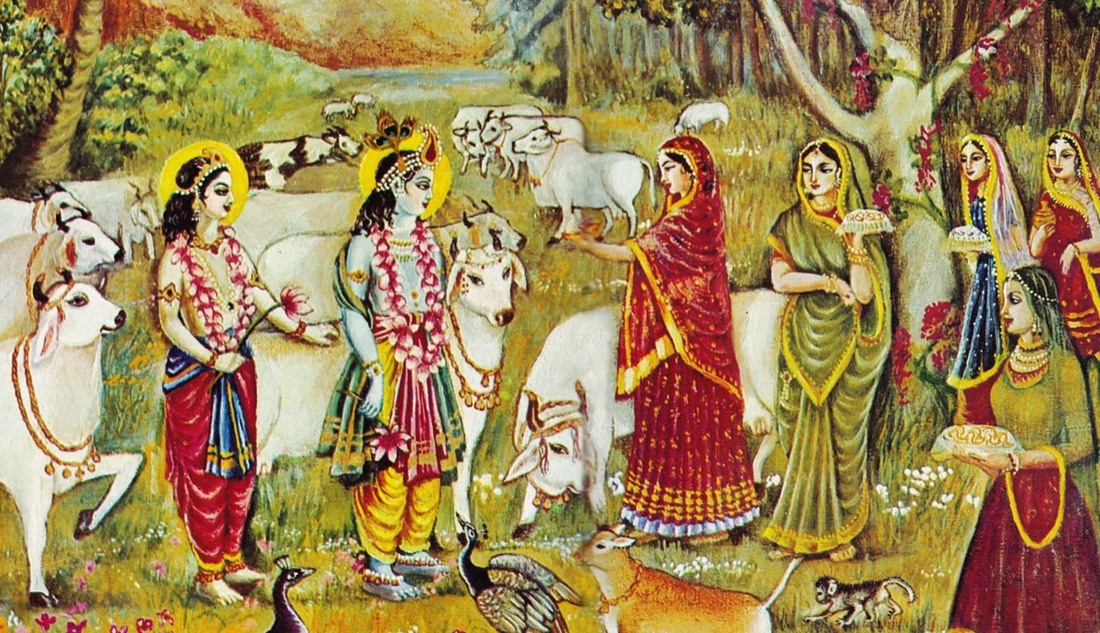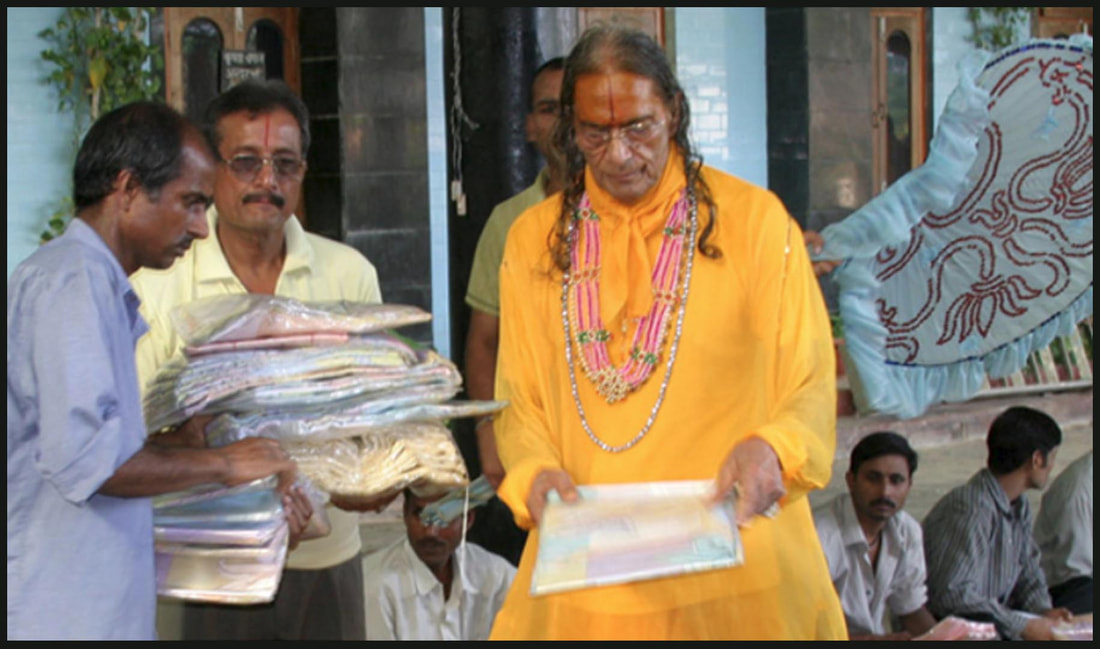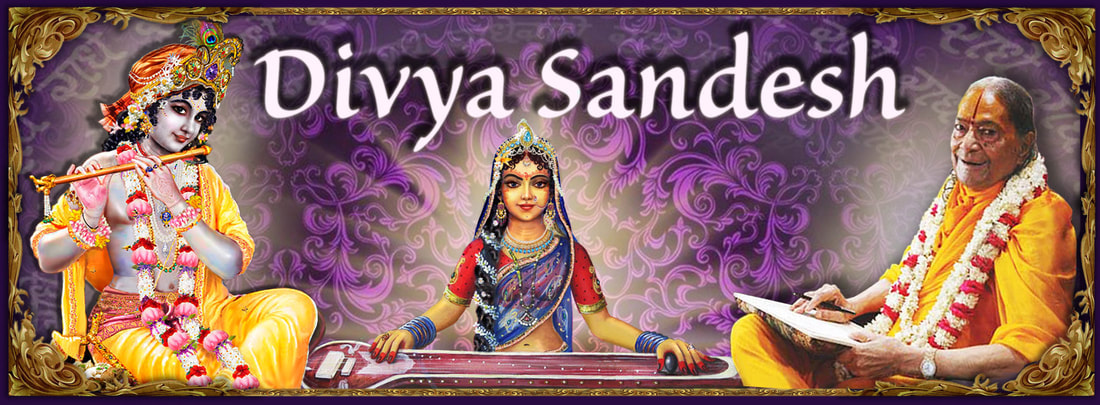Bhakti is All Encompassing |
Attainment of unlimited divine bliss is the goal of every soul. In the previous issue, we had discussed the criteria Anvaya (the path through which a goal is achievable) (1) in detail. During the discussion, we put the 3 paths of God realization propounded in the Vedas, i.e., karma, gyan and bhakti to the test, and surmised that our aim of God realization cannot be achieved by following the paths of Karm and Gyan.
Bhakti alone could meet the test of anvaya.
Now let us put karma, gyan and bhakti to the test of the next two criteria.
Bhakti alone could meet the test of anvaya.
Now let us put karma, gyan and bhakti to the test of the next two criteria.
The second criterion is Vyatireka (व्यतिरेक), meaning “the path without which the goal cannot be achieved”.
In the previous article on Anvaya we had established that the aim of life cannot be achieved through karma and gyan. Yet, we know that infinite souls have achieved the goal and continue to do so. So it is obvious that they have achieved the goal without karma and gyan. Hence, the paths of karma and gyan automatically fail this test as well.
Now let's put the path of devotion to the test of indispensability (vyatireka) and see whether this path meets the test of indispensability. Can God be found without devotion? Shankaracharya says,
In the previous article on Anvaya we had established that the aim of life cannot be achieved through karma and gyan. Yet, we know that infinite souls have achieved the goal and continue to do so. So it is obvious that they have achieved the goal without karma and gyan. Hence, the paths of karma and gyan automatically fail this test as well.
Now let's put the path of devotion to the test of indispensability (vyatireka) and see whether this path meets the test of indispensability. Can God be found without devotion? Shankaracharya says,
शुद्धयति हि नान्तरात्मा कृष्णपदांभोज भक्तिमृते (शं.)
śuddhayati hi nāntarātmā kṛṣṇapadāṃbhoja bhaktimṛte (Shan.)
"Without bhakti, mere performance of karma, or following the path of gyan is not only incapable of liberating a jeev, but they cannot even purify the mind".
śuddhayati hi nāntarātmā kṛṣṇapadāṃbhoja bhaktimṛte (Shan.)
"Without bhakti, mere performance of karma, or following the path of gyan is not only incapable of liberating a jeev, but they cannot even purify the mind".
This means that unless the mind is engaged in the loving remembrance of God, it will continue to be contaminated with material attractions. Bhakti is the only means to purify the mind which has been soiled since eternity. And without cleansing the mind, higher objectives such as self-realization, God-realization, and divine love will all remain unattainable.
The Bhagavatam says,
The Bhagavatam says,
|
धर्म: स्वानुष्ठित: पुंसां विष्वक्सेन कथासुय: ।
तोत्पादयेद्यदिरतिं श्रम एव हि केवलम् ॥ (भा.)
|
dharma: svānuṣṭhita: puṃsāṃ viṣvaksena kathāsuya: ।
totpādayedyadiratiṃ śrama eva hi kevalam ॥ Bhgawatam
|
“If the actions which are performed as per the injunctions of Vedas do not develop an interest and love for Shri Krishna, such actions are reprehensible. So any karma, gyan or yoga devoid of devotion is merely futile labor. In other words, bhakti is indispensable for attaining God.
“You might be able to extract ghee by churning milk of lime, or extract oil from sand crystals (in other words the impossible might become possible), but God cannot be attained without doing bhakti. This is God’s irrefutable law.” Hence, bhakti can stand the test of vyatireka. (2)
Okay, God cannot be attained without bhakti, but does bhakti require other paths? Yes, this question is important and relevant. So pay attention to the third criterion.
Okay, God cannot be attained without bhakti, but does bhakti require other paths? Yes, this question is important and relevant. So pay attention to the third criterion.
The third criterion is independence or anya nirapekṣatā (अन्य निरपेक्षता), which means "the path that does not require any other means".
God cannot be attained through the path of karma. Therefore the question of independence of the path of karma does not arise. Whoever has attained God by following the path of karma has done so by practicing bhakti along-with karma. Remember the best possible result of doing karma alone, by following all the rules and regulations, is swarg.
Similarly, God cannot be attained by the path of gyan either. Gyan bestows self-realization (3) and nothing else. Those who have attained Brahmanand did so by coupling gyan with bhakti. Hence there is no independence in path of gyan either.
God cannot be attained through the path of karma. Therefore the question of independence of the path of karma does not arise. Whoever has attained God by following the path of karma has done so by practicing bhakti along-with karma. Remember the best possible result of doing karma alone, by following all the rules and regulations, is swarg.
Similarly, God cannot be attained by the path of gyan either. Gyan bestows self-realization (3) and nothing else. Those who have attained Brahmanand did so by coupling gyan with bhakti. Hence there is no independence in path of gyan either.
Is bhakti the independent? In other words, does bhakti not need karma and gyan to unite the soul with God?
Devotion does not require any other expedient to grant the fruits. Devotion itself is capable of independently uniting the jeev with God and bestowing the bliss of divine love, premanand. But in the scriptures, all followers of the path of karma have been given the principle directive that karma should be accompanied with bhakti. Brahmacharya, Grihastha, Vanprastha and Sanyas, the four ashrams and the four varnas have been instructed to do bhakti . Only by combining bhakti (the higher principle) with Varnashram dharm, the result of bhakti can be achieved. God realization or cutting asunder the bondage of Maya cannot be done by mere physical rituals (karmakand) of karma marg.
Now a dilemma arises. If it is essential to follow Varnashram Dharma with Para-Dharma (superior ideal), how is it appropriate for a Karma Sanyasi (who only does bhakti) to totally abandon Varnashram Dharma?
Devotion does not require any other expedient to grant the fruits. Devotion itself is capable of independently uniting the jeev with God and bestowing the bliss of divine love, premanand. But in the scriptures, all followers of the path of karma have been given the principle directive that karma should be accompanied with bhakti. Brahmacharya, Grihastha, Vanprastha and Sanyas, the four ashrams and the four varnas have been instructed to do bhakti . Only by combining bhakti (the higher principle) with Varnashram dharm, the result of bhakti can be achieved. God realization or cutting asunder the bondage of Maya cannot be done by mere physical rituals (karmakand) of karma marg.
Now a dilemma arises. If it is essential to follow Varnashram Dharma with Para-Dharma (superior ideal), how is it appropriate for a Karma Sanyasi (who only does bhakti) to totally abandon Varnashram Dharma?
|
श्रुतिस्मृति ममैवाज्ञे यस्ते उल्लंघ्य वर्तते।
आज्ञाच्छेदी मम द्वेषी मद्भक्तोऽपि न मे प्रियः॥ |
śrutismṛti mamaivājñe yaste ullaṃghya vartate।
ājñācchedī mama dveṣī madbhakto'pi na vaiṣṇava: ॥ |
God said in the Vedas that “The one who does not obey my instructions written in Vedas about following Varnashram Dharma is my enemy, how can he be dear to Me”? However God Himself provided the answer to this apparent contradiction in Shrimad Bhagawat Mahapurana written by Ved Vyas Ji Maharaj as -
|
आज्ञायैवं गुणान् दोषान् मयादिष्टानपि स्वकान् ।
धर्मान् सन्त्यज्य य: सर्वान् मां भजेत स तु सत्तम: ॥ 11.11.32 ॥ ājñāyaivaṃ guṇān doṣān mayādiṣṭānapi svakān ।
dharmān santyajya ya: sarvān māṃ bhajeta sa tu sattama: ॥ 11.11.32 ॥ “Though the violation of My instruction regarding the observance of Varnashram-Dharma is punishable as per My spiritual doctrine, those who perform My bhakti abandoning the tenets of Varnashram-Dharma are very dear to Me”.
|
Hence it is confirmed that the Vedic law of following Varnashram-Dharma does not apply to a person who performs bhakti of God.
सर्वे वेदा यत्पदमामनन्ती तपांसि सर्वाणि च यद्वदन्ति । क. 1-2-14
sarve vedā yatpadamāmanantī tapāṃsi sarvāṇi ca yadvadanti ।
That is, "all the hymns of the Vedas inspire and take an jeev only towards God”.
|
Shandilya Muni also says -
न क्रिया कृत्यनपेक्षणाज्ज्ञानवत् ॥7॥
na kriyā kṛtyanapekṣaṇājjñānavat ॥7॥ |
According to Ved Vyas -
अहैतुक्यव्यवहिता या भक्तिः पुरुषोत्तमे ॥3.29.12॥
ahaitukyavyavahitā yā bhaktiḥ puruṣottame ॥3.29.12॥
भक्ति स्वतंत्र सकल सुख खानी
bhakti svataṃtra sakala sukha khānī
bhakti svataṃtra sakala sukha khānī
"Bhakti is independent and is the source of all bliss". As per Shri Roop Goswami and other Rasik Saints -
अन्याभिलाषिता शून्यं ज्ञानकर्माद्यनावृतम्।
“Bhakti should be selfless and ought not be concealed within gyan, karma, penance etc”. Bhakti is independent.
Bhakti can independently bestow the aim of life. All the other paths must turn to Bhakti Mahadevi to give the fruits of their respective paths. Therefore, bhakti is all encompassing.
|
शरणागत-साधक को अन्य किसी भी कर्मादि की अपेक्षा नहीं, उसे तो केवल अपने भक्तिमार्ग-सम्बन्धी विधि-निषेधों का ही पालन करना चाहिए । संक्षेप में विधि यह (कि साधक को) निरंतर श्रीकृष्ण का स्मरण करना चाहिए, तथा निषेध यह (कि उसे) श्रीकृष्ण को कभी न भूलना चाहिए । जो शरणागत भक्त इस विधि-निषेध का पालन करता है, उसके लिए किसी भी अन्य अलौकिक, वैदिक, विधि-निषेध की अपेक्षा नहीं है ।
- जगद्गुरूत्तम श्री कृपालु जी महाराज
प्रेम रस सिद्धांत A surrendered aspirant is not expected to observe any Vedic rules and prohibitions. He should only follow the rules and prohibitions related to his devotional path. For Him the rule to abide by is “constantly remember Shri Krishna”, and the prohibition is “never forget Shri Krishna”. For a surrendered devotee who follows this rule and prohibition, there is no expectation to follow any other Vedic law or prohibition.
- Jagadguruttam Shri Kripalu Maharaj
Prem Ras Siddhant |
If you enjoyed this one, you might also like
Some Pointers to Explore our Literature
Indulge yourself in spiritual material - Click on the images below or the headers
Divya Sandesh
|
Divya Ras Bindu
|
Spiritual TermsDeepen your understandingKnow the real meanings of scriptural words
|
|
We would love to hear from you. Please
|
To get notification about our publications please subscribe by entering the information above
|












